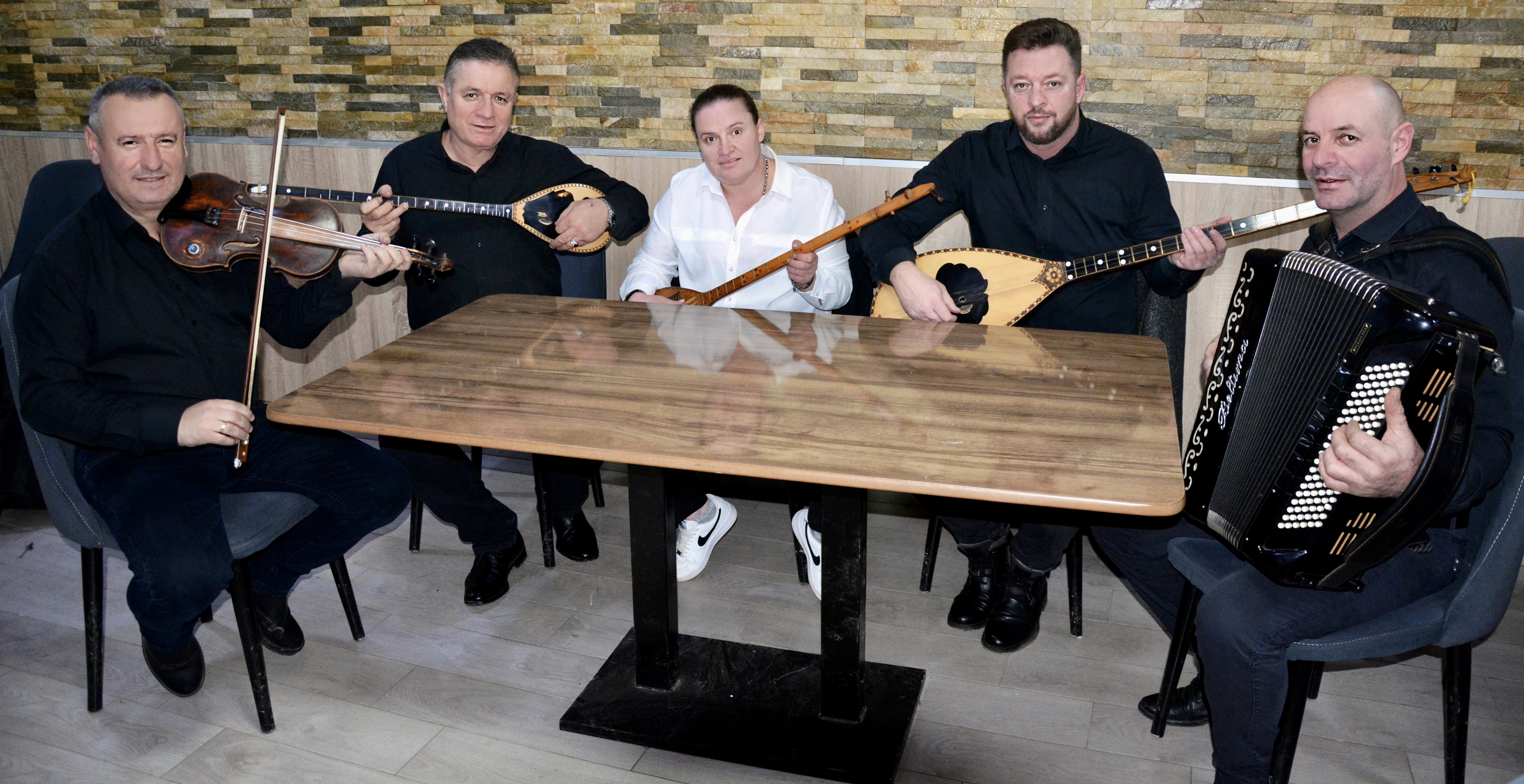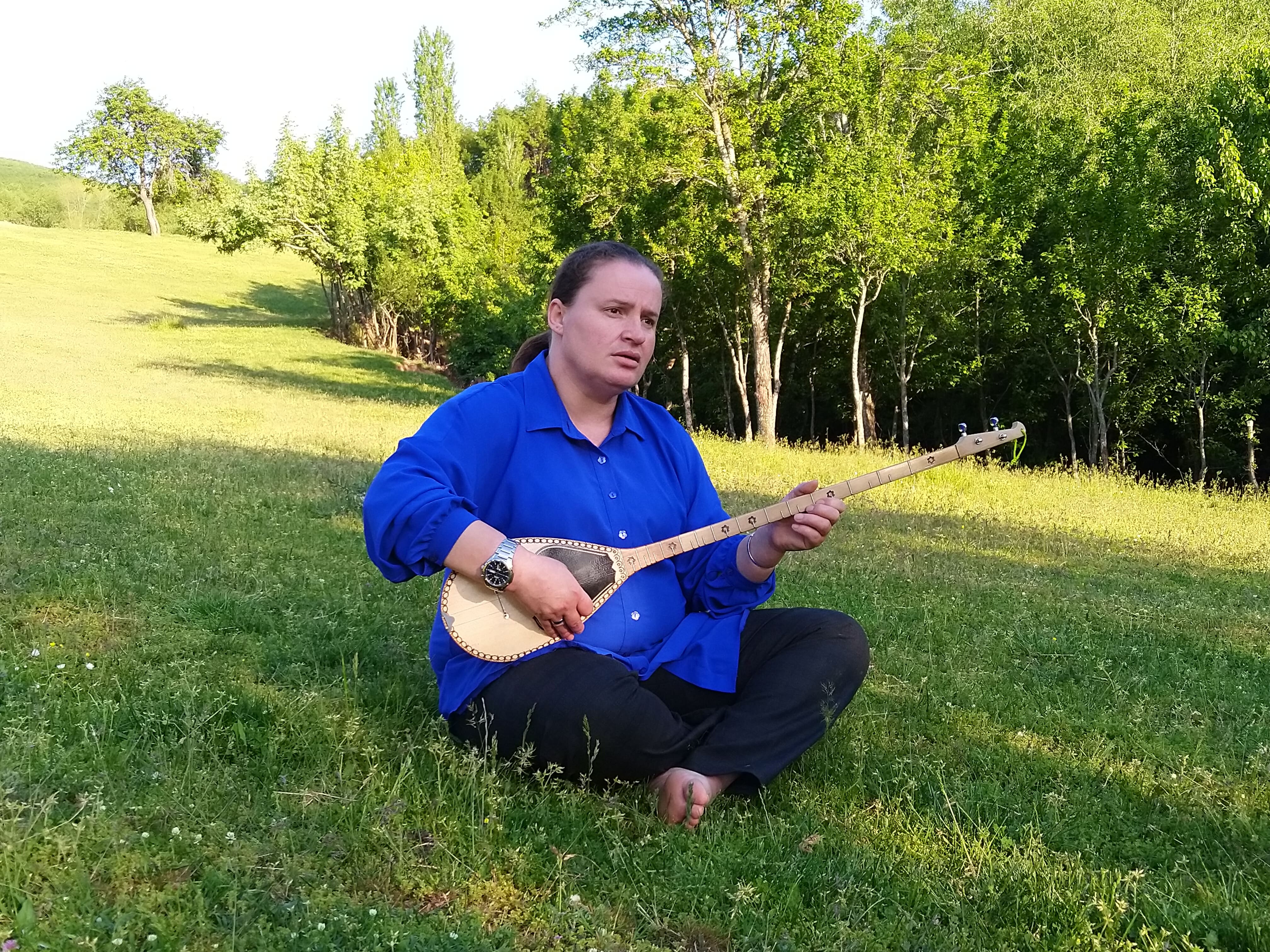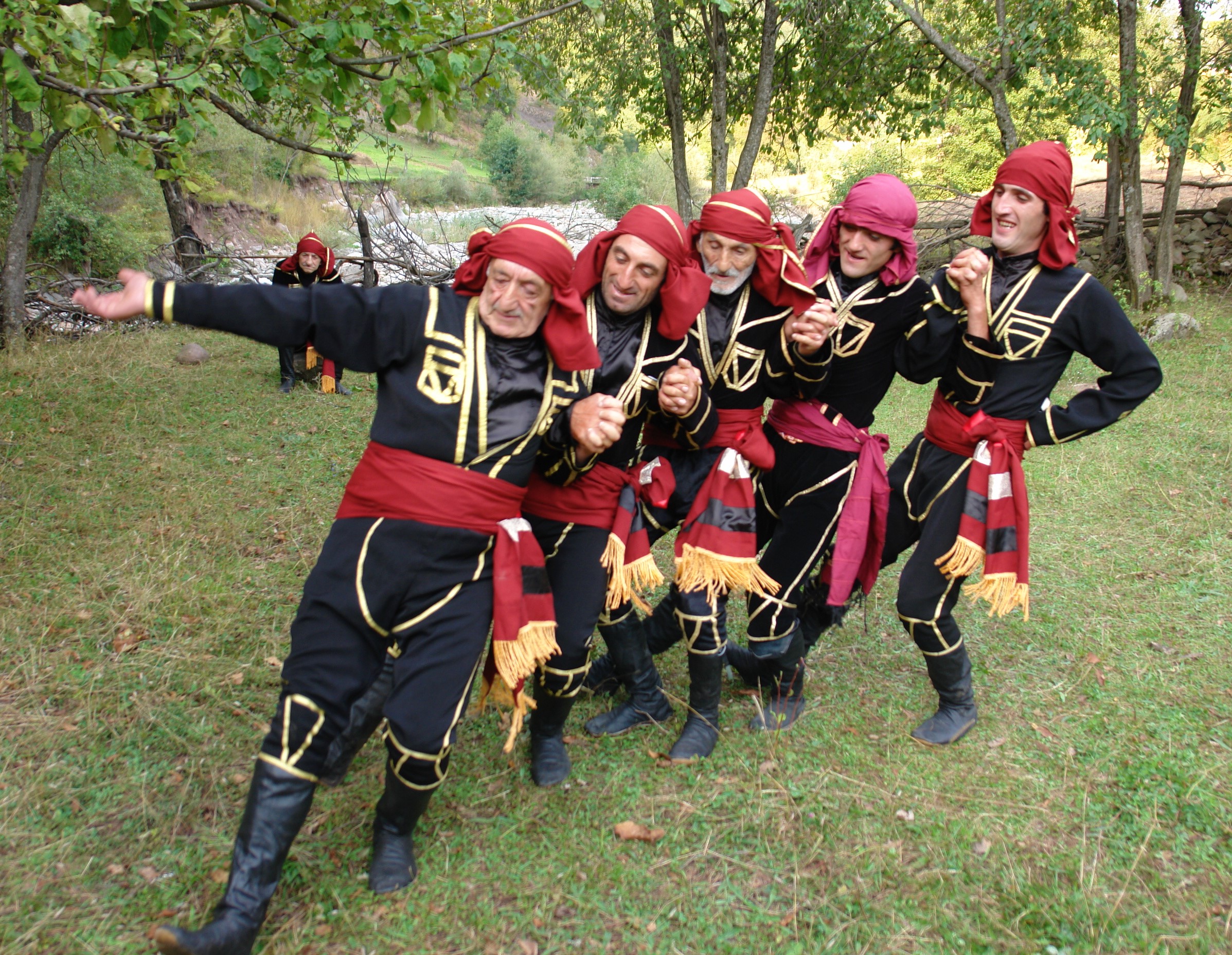Naxhije Bytyqi, Singing Male Epics as a Woman in Kosovo
When I stepped out of her car on that May night, after she picked me up at Prishtina airport, I thought I was going to faint with delight. For from the deep of the thick forest stretching above the farmhouse where she lives on the outskirts of Malishevë came the intricate song of the nightingales, a particularly fitting welcome for this second visit to my friend, Kosovar singer Naxhije Bytyqi.
Can hearing a voice change your life? In this case, I can answer yes. I had met Naxhije two years earlier in the most unlikely of circumstances, lying on a sofa in Paris, France, on a dark Covid night. Traveling was impossible, so I went on a social networking trip. And no doubt knowing my taste for the great traditional musics of Southeast Europe, the YouTube algorithm sent me straight to her. Well, “straight” is an understatement. Let’s just say that my eyes fell on a singing situation that immediately drew me in like a magnet. In the video, a number of musicians, all men, were sitting cross-legged around a low table, playing small, long-necked lutes, a violin, and an accordion, surrounded by all-male listeners squeezed onto couches. From this rich instrumental ensemble sprang a soprano voice, as convincing and powerful as a cry. I took a closer look: the singer was a young woman, alone in the midst of all these men, plucking her two-stringed çifteli lute, [1] and she seemed to be the center of attention.
As a Turkish singer and a bağlama lute player myself, I immediately felt at ease with these songs, even though I couldn't understand the language. Like the ones I used to perform, they followed a descending melody, were based on a regular meter, and the lute accompaniment reminded me, with some variation, of that of Anatolian bards. And the performer was also a woman, who I understood had penetrated this male milieu. Fascinated, I found out more about her, learned the basics of Kosovar music, some rudiments of Albanian, and booked a plane ticket to meet her.
A small country with astonishing musical vitality
Nestled in the heart of the Balkans, in a region steeped in history, the fledgling Republic of Kosovo is modest in size and population (around two million), but great in the richness of its music. Although, as elsewhere around the world, Kosovo's traditions have been overturned by changing lifestyles, modern media, and globalization, the proportion of traditional singers is impressive. As in many rural societies, songs are intended to transmit the values, history and identity of the national community down through the generations. They also still reflect a strict division of roles between men and women, in both Muslim and Christian sectors of society. There are women's songs, closely linked to family and domestic life, and songs belonging to men, such as the epic song (këngë kreshnikësh), which extolls virtues considered more specifically masculine: bravery, a sense of honor, generosity, and fortitude in the face of a difficult history.
Kosovo Albanians are the largest ethnic group in the country, part of a transnational Albanian-speaking region straddling Albania, Montenegro, and North Macedonia.[2] Throughout the northern part of this area, the figure of the bard remains a key pillar of national identity. Prominent recent poets include Dervish Shaqa (1912-1985) and Bajrush Doda (1936-2011), and traditional ballads are still being produced, even among the younger generations. The ability to master the crystal-sounding chifteli—or the three-string sharki (a deeper, bulkier lute)—and to perform traditional epics, whether original songs or part of an inherited repertoire, still bestows an aura of respect on those known here as “rhapsodes.” [3]

Photo 2: Dervish Shaqa
Albanian-language epic songs, like those of other peoples in the region like the Serbs[4], have their origins in the very distant past. The Albanians, whose first written records date back to the eleventh century, see themselves as warriors who fiercely resisted the assaults of foreign powers—Normans, Byzantines, Bulgarians, Serbs, Ottomans—and occasionally made tactical alliances with them. The earliest historical figure to be evoked in songs is George Kastrioti, better known as Skanderbeg, a national hero glorified for his rebellion against the Ottoman armies in the mid-fifteenth century. The Balkan uprisings and conflicts of the late nineteenth and early twentieth centuries, which accompanied the dismemberment of the Ottoman Empire and the emergence of new nation-states, saw the birth of other martyrs to the Albanian cause, whose feats continue to be sung. Recent history has added countless more figures to this patriotic pantheon, reinvigorating the musical genre.
Kosovo was established in 1945 as an autonomous province of the Socialist Republic of Serbia within Josip Broz Tito’s Yugoslavia. After Tito’s death in 1980, however, Kosovo’s autonomy was challenged by the nationalistic policies of Serbian President Slobodan Milošević. The breakup of the Yugoslav federation ten years later ultimately led to the Kosovo War in 1998, driving many into forced exile. The massacres, rapes, and widespread destruction that took place largely targeted the province’s Albanians. Odes were immediately composed in memory of the combatants who fell during these tragic events, like Adem Jashari, one of the founders of the Kosovo Liberation Army, killed with fifty-seven members of his family. Such odes form a large part of today’s repertoire of epic and patriotic songs in Kosovo. The country, which proclaimed its independance in 2008, has yet to gain full international recognition.[5] Praising historical figures in song thus retains its power as a means of asserting national identity.
“In the midst of men, with the lute in hand”
Born in 1983 into a peasant family of eleven children in central Kosovo, Naxhije (pronounced Na-djee-yeh) represents the generation that grew up under Milošević's regime and suffered the marginalization of Kosovo Albanians. She experienced the horrors of the 1998–99 conflict as a teenager: the family fled and hid in the thickets of the surrounding hills for a whole year, fortunately not suffering any losses of life. As a child, she discovered her vocation as a singer and çifteli player in the underground schools of the 1990s, set up in reaction to the repressive policies of the Belgrade regime. Twice, she took me to the graves of her former teachers, two young men lost in the war.
After independance, she began performing as a soloist at family celebrations and won several prizes at local festivals, gradually establishing herself as a major performer. Her passion for music is also rooted in family tradition. Her father Aziz, eighty-five years old, is a shepherd and a fine fyell (recorder) and bishnica (bagpipe) player, two instruments closely linked to his profession. Two of Naxhije's closest brothers also learned to play the çifteli, and one of them, Ramiz, performed regularly with her before emigrating with his family to Italy. But in a society that was and is strongly patriarchal, , singing epics in gatherings of men was not a place for a woman. Even women playing traditional instruments are rare in Kosovo.
 Hosts, guests and musicians socializing between two songs, Kosovo, 2020
Hosts, guests and musicians socializing between two songs, Kosovo, 2020
On various occasions such as weddings and circumcisions, lengthy evening recitals would traditionally bring the men together in the oda, the reception room of a house, often adorned with magnificent paneling and offering a unique space for conviviality. Guest rhapsodists (increasingly joined by violinists, accordionists and percussionists) take center stage around low, food-laden tables known as sofrat, a word also applied to the musical events themselves, which can occupy entire nights. Those present smoke and drink, socialize, and listen with intensity, passion, and even ecstasy. Some verses may elicit exclamations of appreciation and joy, followed by shouts of encouragement. The musicians are not to be outdone, showing their enthusiasm by banging their lutes. A shower of bills lands on their table to reward them.
Recitals take the form of more or less codified suites, with the audience held spellbound by alternating instrumental pieces that set the musical framework, and sung pieces freely drawn from the repertoire according to the context or inspiration of the moment. The transition from one to the other is made by a short supporting instrumental formula. This dynamic is also maintained by a variety of rhythms, symmetrical or asymmetrical. The most complex of these, containing twelve beats, is specific to epic narrative. This orally transmitted poetry is based on dialogue and verbal jousting between singers, and is constantly enriched according to circumstances, such as recent political events. The songs evoke the feats of arms of the great figures of history as well as the pain of exile, the torments of love, and the beauty of the native land.

With her band in Malishevë. From left to right, Beqir Isufi, Xhadi Gashi, Naxhije Bytyqi, Abit Kadrija, Avni Bega
“In the midst of men, with the lute in hand” : these verses in praise of Dervish Shaqa, one of Kosovo's greatest songwriters, take on a new signification when sung by Naxhije. For she is today the only woman to take part in sofrat and to perform epic songs in the traditional way within a male ensemble, a position she has achieved not only by force of will, but also thanks to her exceptional voice and musical mastery. She was helped along this path by a mother who spared her from having to do housework and by an ancient social tradition specific to Albanian society, that of the so called “sworn virgin” or burrneshë. According to kanun or customary law, a woman is granted the right to adopt a man’s way of life under certain circumstances—to escape a vendetta, for instance, or pass on property—on condition that she renounce marriage. Although this tradition only continues among a handful of elderly women, the myth remains in people’s minds, and Naxhije says she is honored to be perceived as such. She is also proud of having seized this freedom.
Sitting next to her in her car, on the way to the café where she goes each morning—another exclusively male environment, especially in rural areas—I listen to her singing at the top of her voice and unfolding the melismas typical of Kosovar singing. Her whole being seems to be drawn into this strong, tense voice. Like that of the nightingale, it is an affirmation of existence, the defense of an inherited territory, somewhere in the heart of the Balkans.

The author with Naxhije at a farewell picnic near her home in Malishevë in 2022
Playlist
- 1.“Tahir Meha” (historical figure). One of Naxhije’s first clips, recorded when she was twenty-five, sitting in male outfit with two renowned rhapsodes, Ibish Broja (left) and Tahir Drenica (right).
2. “Moj Kosovë ta puthsha plagen” (My Kosovo, I kissed your wounds). Private gathering, 2018.
https://www.youtube.com/watch?v=BUkvEWDwxpU
- 3. “Djell e hanë” (Sun and moon, patriotic song). With her brother Ramiz Bytyqi, in 2018.
- 4.“Qorr Ilazi” (historical figure). Clip released for New Year’s 2023.
[1] The ç in Albanian is pronounced like an English “ch.” As its Turkish name suggests, the çifteli is a lute with two strings (çifte telli) tuned to the fourth, with the lower string essentially acting as a drone.
[2] Kosovo is home to a number of ethnic and/or linguistic minorities, the largest of which is the Serbian community (some 8%). Kosovo Albanians speak a version of the gheg dialect, which prevails in the northern half of the Albanian-speaking Balkans. Polyphony dominates in the southern half where the Tosk dialect is spoken, while music in the northern half is monodic.
[3] For a deeper insight on Albanian epic, see Scaldaferri, Nicola, ed. 2021. Wild Songs, Sweet Songs: The Albanian Epic in the Collection of Milman Marry and Albert B. Lord. Cambridge, MA: Milman Parry Collection of Oral Literature. Available online https://chs.harvard.edu/read/wild-songs-sweet-songs-the-albanian-epic-in-the-collections-of-milman-parry-and-albert-b-lord/
[4] Serbian epic poetry is performed to the gusle or lahuta, a single-stringed violin, while its Albanian equivalent, the lahutë, has almost disappeared in practice, largely replaced by lutes.
[5] At present, only 98 of the 193 members of the United Nations have recognized Kosovo’s independance. Slobodan Milošević was eventually brought before the International Criminal Tribunal and died in The Hague in 2006.
Cover Photo - Naxhije Bytyqi



.jpg)
